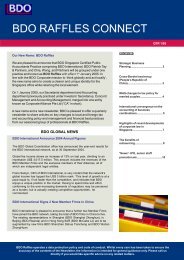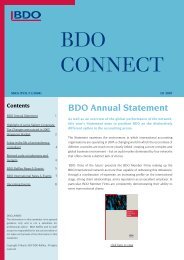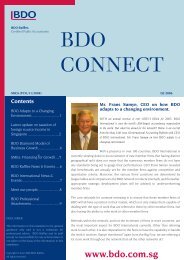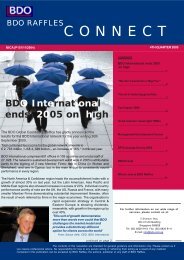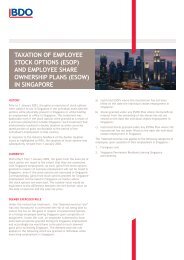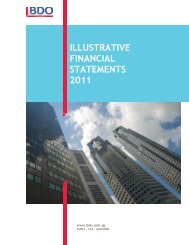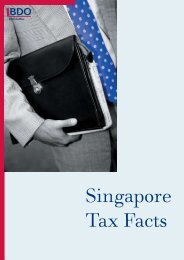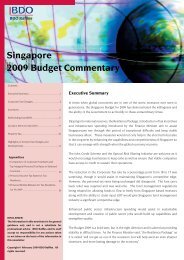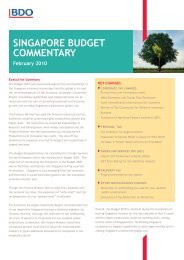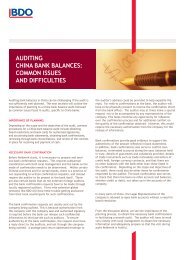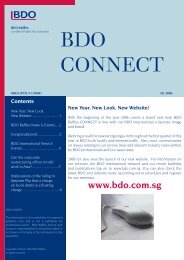MANAGING PARTNER'S MESSAGE - bdo singapore
MANAGING PARTNER'S MESSAGE - bdo singapore
MANAGING PARTNER'S MESSAGE - bdo singapore
- No tags were found...
Create successful ePaper yourself
Turn your PDF publications into a flip-book with our unique Google optimized e-Paper software.
BDO CONNECT 7INTERNATIONAL BUSINESS SERIES:NEW FRONTIERS – LATIN AMERICA: NO LONGER ANECONOMIC BACKWATERBy Tah Wee Han,Management Consulting Services DirectorT: 6828 9184E: weehan@<strong>bdo</strong>.com.sgFor those of us who recently had aplate of Chicken Rice at our favouritehawker centre, it is quite likely thatthe poultry may have come from oneof Brazil’s large meat processors. If youhave travelled recently on one of theregional flights in Europe or America,you may have sat in an Embraer,designed and built in Brazil.From East to West, the undeniablegrowing presence of “Multilatinas”,a term often used to describe Latinmultinationals, is there for all to seeand feel. While it is no surprise tosee the increasing global presenceof multilatinas emerging from Brazil,which accounts for around half of LatinAmerica’s economy and population,multilatinas are also common to the restof the Spanish-speaking Latin Americaneconomies across various sectors. Mexicois home to the world’s 3rd largest bakery,behind only to Japan-Based YamasakiBaking and U.S.-based Nabisco. It is alsothe home to one of the largest telecomscompanies and its owner, Carlos Slim,the world’s richest man.While many of the developed nations’economies were brought to theirknees by the financial crisis, LatinAmerica has remained relativelyunscathed. The region has becomea very different place from previousperceptions commonly associated withit, one of high economic instabilityand slow business. Some economywatchers have predicted the 2010s tobe the decade of Latin America. TheWorld Bank is bullish on its prospects,holding the view that while matureeconomies caught a pneumonia duringthis financial crisis, Latin Americaonly ‘caught a cold’ after having beenimmunised from past crisis.While showing strong signs of promise,there are persistent long term challengesthat the region faces. Shortage of skills,education, poor infrastructure, securityand rising violence – commonly relatedto drug related activities, most notablyin Mexico. Government bureaucraciescan often impede foreign entrants intothe markets and increase business costs.Brazil has notoriously complex regulatoryprocedures and is ranked 127th out of183 countries in the most recent WorldBank’s annual Doing Business Report,below countries like Mozambique andNepal. Roads and infrastructure leadingto the western side of Latin America arenotoriously bad, thus making transportand logistics costs very high - in somecases, even higher than import duties.It has been said that it may be cheaperto export goods from east Asia to Chile,for example, than from Brazil. As such,this has forced many companies withrelevant markets there to producelocally.Despite the challenges, they canbe overcome. The internet and thegrowing frequency of air travel isspeeding integration within countriesand between countries in the region.According to IATA, freight volumes inthe region have grown by 40% last year,almost double the global average.Other than Venezuela and Bolivia,to a lesser degree, governments arepro-business. While taxation may bedifficult, language is a barrier, timerequired to establish a business andbureaucracy are negative issues, manyforeign companies have managed towork around them. At the same time,Latin America offers what many matureeconomies do not offer, which is thatof a large, expanding domestic marketand a young and growing population.Some of our very own Singaporecompanies have led the way withsignificant investments made intoLatin American region. Companieslike Keppel Offshore and SembcorpMarine are leading players in Braziland Mexico’s shipyard and oil and gassectors. – together they employ over20,000 staff in their Brazilian facilities.On the hospitality side, Banyan TreeHoldings has two resort projectsalong the Mexican coastal regions. Inagri-business, companies like Petra,Olam and Noble Group has also madeinvestments in Brazil and Mexico.Increasingly, our SMEs are also gettinginto the act. This includes Tai Hua FoodIndustries, a soy sauce company, whostarted exporting to Mexico in 2008As most business owners will tell you,doing business was and is never easyand it is definitely not for the feinthearted. However, for those who areentrepreneurial and farsighted enoughto venture away from the well-troddenpath, therein may lie a ‘promisedland’. All things considered, now maybe the best time ever to launch orgrow a business in Latin America - aslong as one bears in minds that thekey to success there may lie in havingsufficient cash, preparation andpatience.



